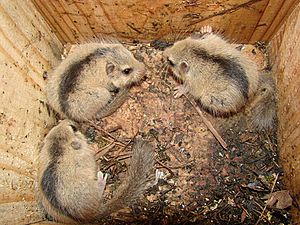Japanese dormouse facts for kids
The Japanese dormouse (Glirulus japonicus) is a tiny, cute rodent that lives only in Japan. It's often called Yamane (山鼠) in Japanese, which means "mountain mouse." This little creature is the only species in its group, Glirulus.
Quick facts for kids Japanese dormouse |
|
|---|---|
 |
|
| Conservation status | |
| Scientific classification | |
| Kingdom: | |
| Phylum: | |
| Class: | |
| Order: | |
| Family: | |
| Subfamily: | |
| Genus: |
Glirulus
Thomas, 1906
|
| Binomial name | |
| Glirulus japonicus (Schinz, 1845)
|
|
Home and Habits
The Japanese dormouse lives in cool, temperate forests. They are mostly active at night, which means they are nocturnal animals. They have a special ability: they can run really fast upside down! They hang underneath branches and move quickly.
What They Eat
These dormice mainly enjoy sweet nectar from flowers and pollen. This makes them important for helping plants grow. However, if a female dormouse is feeding her babies, she might also eat small insects. This gives her extra energy and protein.
Appearance
The Japanese dormouse is quite small. It has soft, brown fur on its back and white fur on its belly. It has big, dark eyes and small, rounded ears. Its tail is bushy, like a squirrel's, and helps it balance when climbing.
Life Cycle
Japanese dormice usually have their babies in the warmer months. The mother dormouse builds a cozy nest, often in a tree hollow or a bird's nest. She gives birth to a few tiny, helpless babies. She takes good care of them until they are old enough to find food on their own.
Hibernation
During the cold winter months, when food is scarce, the Japanese dormouse goes into hibernation. This means they go into a very deep sleep. Their body temperature drops, and their heart rate slows down. They save energy by sleeping through the winter. They wake up when spring arrives and food becomes available again.
Conservation
The Japanese dormouse is currently listed as "Least Concern" by conservation groups. This means they are not in immediate danger of disappearing. However, it's still important to protect their forest homes. Keeping their habitats safe helps these unique little animals thrive.
See also
 In Spanish: Lirón japonés para niños
In Spanish: Lirón japonés para niños
 | James Van Der Zee |
 | Alma Thomas |
 | Ellis Wilson |
 | Margaret Taylor-Burroughs |


